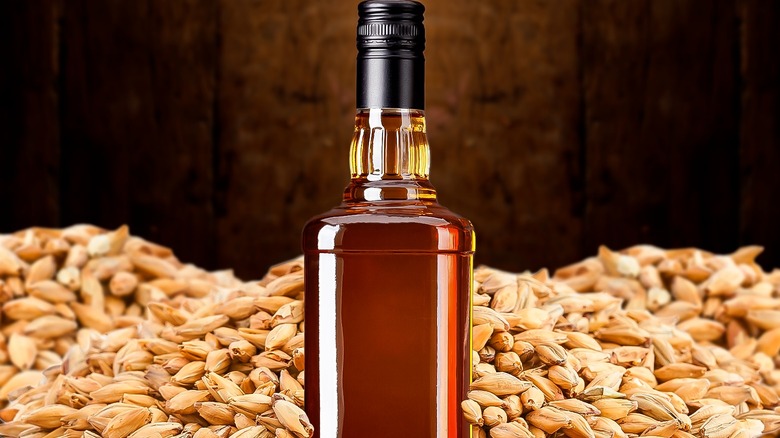How The Grains Used Actually Impact Whiskey's Flavor
In the intricate world of whiskey production, the selection of grains plays a pivotal role in defining and impacting the distilled spirit's final flavor profile. Whiskey can be made with rye, wheat, corn, and barley, and the way these ingredients are combined results in a distinctly unique flavor. To dive further into this topic, Tasting Table spoke with Colby Frey, a seasoned whiskey farmer and the co-founder of Frey Ranch Distillery.
Frey emphasizes how each different grain contributes uniquely to whiskey's taste. For instance, Frey said, "Rye is a little spicier, corn lends a sweetness, and wheat imparts a creamy mouthfeel." And, Malted barley, interestingly, can remind you of pastries. Frey adds how this nuanced understanding of grain flavors allows distillers to experiment with different mash bills, much like a chef fine-tuning a recipe. Specific combinations of grains in mash bills allow for whiskeys to range widely in taste and character.
One thing to note is that rye whiskeys, at least in the U.S., must be made with at least 51% rye. The other 49% is up to the whiskey distiller. "The fun part about whiskey is appreciating how vast and diverse the category has become," Frey added. The key to a diverse and rich world of whiskey is experimentation, starting with the mash bill and the choice of grains used.
Each bottle of whiskey tells a story
Whiskey's appeal reflects its flavors, and each bottle tells a story. "As a farmer, I'm fascinated by the different whiskey-producing regions around the world — and how they tap into the local agriculture and use the climate to their advantage," Colby Frey observed. Whiskey is intrinsically linked to the environment and land from which it springs. However, this bond also exposes whiskey production to the whims of climate change.
Whiskey farmers and makers must adjust as climate change affects their crops, such as wheat and barley. In July 2023, The Guardian reported how farmers across the United Kingdom experienced fewer dry days than usual, leading to waterlogged soil and difficult grain harvesting conditions. Rising temperatures can also negatively impact wheat production. Ending on a more positive note, Frey advocates an adventurous spirit for whiskey enthusiasts: "As a consumer, you get to enjoy figuring out what you like best — and the surest way to do that is to keep an open mind and experiment."

